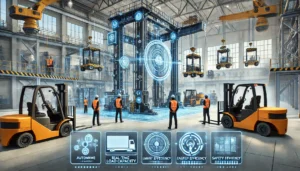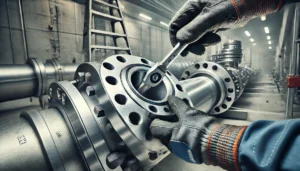While managing industrial waste has become a significant social topic, did you know that unmanaged industrial waste is enough to cause industrial pollution the same as that caused by millions of cars combined in a year? Such facts help comprehend the magnitude the problem holds towards the constant need of treating industrial waste. Moreover, the manufacturing industry plays a major role in society today, and is considered the backbone for supporting the economy of a country. This quotes brings into context the importance of responsible waste management.
A responsible approach towards business processes is not just an environmental issue, but a necessity, something that transforms waste management issues into a gold mine. Also, business could save funds, enhance operational productivity, and even bus the public image of the company through implementation of sustainable policies. In this light, Induskart emerges as an example. Induskart with its wide range of industrial products from safety equipment to handling tools serves as one of the suppliers which can assist in straightening the waste problem of various businesses. It is remarkable how companies industrial products such as those offered by Induskart help in shaping best practices aligned with waste management.
Understanding Industrial Waste:
Definition and Types of Industrial Waste:
An industrial waste definition can be described as a term that covers a large spectrum of elements produced from activities such as manufacturing, construction or even mining. Those can be split into:
- Hazardous waste: This consists of chemicals, toxins and even flammable wastes.
- Non-Hazardous Waste Examples: paper, wood, and glass.
The Impact of Improper Waste Management:
Dangerous waste management can result in the following repercussions:
- Environment damage: Degradation of air, water, and soil quality.
- Health hazards: Risk of injury to public health through exposure to harmful materials.
- Financial: Economic expenditures related to cleanups and fines.
Common Types of Waste in Various Industries:
- Construction and Infrastructure: Concrete, metals, and plastics.
- Manufacturing: Chemical waste, metal scraps, and packaging materials.
- Pharmaceutical: Biochemical waste and expired products.
- Petrochemicals: Hazardous chemicals and industrial effluents.
Key elements of Integrated Industrial Waste Management Strategy:
A plan of Industrial Waste Management requires a step-by-step approach. Each step is fundamental in achieving high levels of optimum performance and eco-friendly practices.
Assessment and Segregation:
- Categorization: An organised waste identification system including non-hazardous scrap materials and hazardous chemicals.
- Segregation: Waste should be separated at the place of origin.
Reduction and Recycling Strategies:
- Waste Minimization: Planning techniques that lower the amount of waste produced. This might include changes in a certain process, substitution of materials, or better productivity.
- Recycling and Reuse: Finding ways of recycling waste materials is an important task. Not only does it contribute to the pollution problem, but it can also reduce expenses that could be of economic use.
Using Right Tools and Equipment:
- Safety Equipment: Dealing with hazardous waste needs protection for an adequate safety equipment of which Induskart is known.
- Handling Tool: For proper segregation and transportation of the waste, industrial bins, and separators with conveyors are tools of considerable aid. These various handling tools provided by Induskart can help mobility for their waste management solution.
Compliance and Regulations:
Abiding by the boundaries of the law and policies aimed at protecting the environment are mandatory in managing industrial waste.
Overview of Laws and Guidelines:
- National and International Regulations: Complying with local and global policies for waste management is very essential for any industry.
- Regular Updates and Training: Policy change needs to be communicated and staff trained accordingly.
Key Regulations Relevant to Industries Served by Induskart:
- Rules for Managing Hazardous Waste: Very pertinent for industries working with chemicals and hazardous industrial materials.
- Guidelines for Managing E-Waste: For industries dealing with electronic equipment and machineries.
- Construction and Demolition Waste Management Rules: These apply to the construction and infrastructure sectors.
Innovative Waste Management Techniques:
The different forms of waste management are diversifying as new approaches and technologies are introduced.
Technological Advancements:
- AI and Machine Learning: These technologies are being utilized for more efficient sorting and management of waste, thus increasing recycling rates.
- Internet of Things (IoT): IoT devices can be placed in bins and other management systems to provide real time information about the amount of waste in the bins which helps in planning collection schedules.
Case Studies and Examples:
- An AI based waste sorting system was set up at a pharmaceutical company that greatly enhanced their recycling rates. Induskart serves this sector as well by providing tools and equipment that enable such systems.
- In the construction industry, a project employed IoT for advanced waste management which is an area where Induskart’s products are extensively used.
Role of Professional Expertise and Partnerships:
The intricacies of waste management require collaboration skills and a combination of different skills that offer various perspectives of waste management.
Consulting Experts:
- Expert Guidance: Waste management consultants developed bespoke strategies for particular sectors so they can come up with effective and targeted plans to execute.
- Training and Education: Other than providing executive level staff with necessary skills for proper waste management, experts can train staff at all levels of the organization.
Partnerships for Efficient Waste Management:
- Collaborative Efforts: Many industries together with waste management and technology providers form partnerships which in turn leads to solving issues with shared knowledge and technologies.
- Community and Government Relations: Working with local communities as well as the local authorities can improve the adequacy of the waste management functions.
Induskart’s Contribution to Sustainable Practices:
Induskart as a corporation displays commitment towards sustainability by the products they sell.
Supporting Ethos:
Induskart’s wide selection of products such as handling and safety tools exhibit support towards eco-friendly waste management as well as efficient resource management, which portrays their environmental responsibility.
Indirect Promotion:
- Induskart maintains and furthers their clients’ ability to carry out effective waste management procedures through the provision of necessary industrial tools and equipment, thus, aids in reinforcing sustainable industrial practices.
Conclusion
An effective industrial waste management plan is necessary from both an environmental and business perspective. A plan’s primary details of assessment and segregation, reduction and recycling strategies, compliance with applicable regulations, and the use of new innovative technology outlines the sustainable practices within industrial frameworks. Professional partnerships also assist in attaining optimum waste management goals. Induskart, with its extensive range of relevant products and commitment to sustainability, underscores its role in this crucial endeavor.










